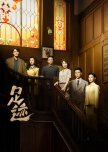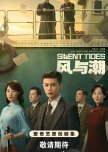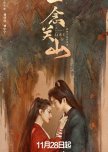
A captivating trilogy on "living in interesting times" as a wronged woman and individual
Three stories, the 1st set in the late Republican period, the 2nd in an early Communist period and the 3rd in "roaring 90s", in the same city (Shanghai), all stories greatly "witnessed" by the same house, which was a family home (later a hospital/working place) of the first female protagonist, a working and living place of the second and the third FL: three women of different generations sharing a mutual family bond and leaving their "footprints", their life stories, romances, spirits and strenghts for each new generation to come, symbolically conveyed to the audience with passing the pocket watch (gifted to the first FL by her husband) on to the next generation .The setting of all three stories is historically and visually impeccable in every detail, object, costume and prop, helping a viewer to fully immerse in the time treated in each arc. Visual aesthetics of the first two stories are furtherly accentuated by framed chiaro-scuro shots under porches and arcades, looking like paintings or precious old photos. This clear and sophisticated retro vibe is replaced by "modern antiques" bursting colours in the third story. The artistic department covering three different period of times and the camerawork are perfect, 10/10. The choice of classical music and Chinese folk tunes serves well particularly in the 2nd story, where it is almost part of the script: FL and ML get closer thanks to their love for fine arts in general (FL is a designer and a painter), it helps them to understand each other.
But the overall tune of the three stories is different, each fitting the time and type of storytelling. The first story is a pure narrative, told by the 2nd FL (an elderly lady at the moment of storytelling) to the 3rd FL (her grandaughter) in the lowest moment in life of the latter (it isn't clear if she tempted a suicide or collapsed due to a shock of being unintentionally involved in a fraud and money embezzlement). That's the reason why the first story flows so well, scenes and episodes follow the memories and story telling of an old woman who is an artist herself, who deeply loved and respected her aunt (1st FL), a doctor who studied abroad, coped with difficult family issues, challenged societal norms and had a beautiful love story with her uncle. Excellent dialogues, acting and directing fully delivered that story.
Having a terrible father and a weak mother, this aunt was the only person YiYi (2nd FL) could count on. She was her polar star and a rolemodel to follow even when they've lost contact and she ought to face even greater challenges. Two actresses who impersonated the 2nd FL did an amazing job. Great story, great acting, aesthetics and subtle use of arts are the reasons why there was no drop in the overall quality as it happened in the War of Faith when the story turned from the (opulent) Republican to (poor) Communist era in Shanghai.
The plot and dialogues, although simplified and sometimes overdramatised to fit into the format of 10 eps per arc, are credible and sufficient both to characterise persons involved and realistically depict the time and the environment. Probably, the story in the 2nd arc is closest to real historical setting I've seen of this period in any Chinese drama (also because it avoided to deepen certain events and purges in the first 5 years of Communist takeover, while how the Cultural Revolution impacted the story was only hinted and not particularly deepened). An incredibly credible story, which feels both realistic and poetic.
After these two dramatic stories, full of turbulences, the third felt... anticlimatic. Again, the environment was faithfully represented, the actors did their job etc., but the story was not captivating enough. It has its good aspects (politics, business and relations are actually interesting as they were in previous arcs), but, imo, it fails to explain the characters as they were explained in the the 1st and the 2nd. The 3rd FL is emotionally volatile, maybe even unstable (that's why I've thought she tried a suicide), domineering towards her boyfriend for no reason. Having such a great grandma, she shouldn't be like that... The always upright 3rd ML doesn't shine either and the chemistry between the leading actors is not particularly credible. Maybe, we should take their story as a passage obligé to hand down the pocket watch to some future descendant who will live in more demanding times. Despite these flows regarding mainly the 3rd story, I strongly recommend you to watch this well-written, well-crafted and performed drama.

Enchanting and mentally stimulating artwork, great in every aspect
The first drama I've watched (and rewatched) from the first to the last second, intro and outro included. Excellent direction, pacing and balance between suspence and distension, care for details, lights, settings, camera frames...The plot is apparently simple: after discovering his ex is missing, an underdog (blogger with passion for investigations nicknamed Da Hui Hui) starts to suspect she was killed by a renowned ceramic artist and a rising young prof (Zeng Jie) with "tending to perfection" as his Leitmotiv. DHH befriends a policeman (Li De) who believes "only in evidence" and initially doubts his "logic behind truth" (which is also the name of DHH's blog-channel) but is intrigued by his sense for details and deduction methods based on clues, assumptions, leads and circumstantial reasoning. Their explicative dialogues are intermittently inserted in action scenes regarding mainly the life and the personality of the artist DHH intends to "debunk" and DHH's flashbacks regarding his ex. Gradually, DHH discovers that behind the well-cured image of a sophisticated artist "tending to perfection", self-confident and socially respectable person, ZJ is an insecure person, womanizer, social climber and money-grabber in an unhappy marriage with a rich woman who helps him to maintain the respectable image in public, but belittles him in private, triggering his terror of poverty and aggressivity. The life of this couple (and in particular the life of ZJ) is meticulously scrutinized and displayed through numerous flashbacks, containing incredible findings, twists and clues, steadily complicating the story, like drops of rain gradually enlarging the crater and flowing further on.
Fluid elements are omnipresent and aesthetically excellently employed: the rain scenes, the ocean light effects in DHH living room/studio, close shots of intoxicating liquids being poured in glasses... conveying the sense of slippery, of danger, of a vague dream and making us doubt of what we see. To pay his tuition, ZJ painted countless copies of Monet's "Sunrise, impression" - ofc. the choice of this painting wasn't casual: its unique haziness inhences the sensation that the reality we see is just a blury vision of what impressed us the most.
All scenes are perfectly lighted and staged, cured in details, often set as theatrical stages with all actors performing great. But there's ONE...
UNFORGETTABLE scene: ZJ's monologue, brilliantly delivered by Wang Duo, in the shed where he painted Monet's reproductions. Young and poor ZJ gets drunk for the first time. He has just won his first important award and heard that his hard-working father was celebrating it with his colleagues in a distant place where he worked. He buys a bottle of cheapest booze, returns to the shed, gets stoned seeing the sea from the painting pouring down and talking to himself, disjointly commenting who knows what (the painting, his poverty, his parents' unreasonable ambition?), creating the following couplets: "Harmony blending light with dust/ Dust blinding my vision /Vision blurred by arrogance". That's the moment in which we realize ZJ is a true artist, he is not just posing as one. Vulnerable, desperate and drunkly aware that recognition seeking will be his curse. A rare moment in which he is truly himself, not pretending. Smth truly memorable, a must watch scene.
The choice of music is not extensive but is good, in particular the melanchonic song in English.
Ofc., there were certain "blemish flaws" even in such a "tending to perfection" drama. The story covered a good part of ZJ's life but left certain "tiny holes" (why his parents were so ambitious, expecting from him to sacrifice everything and everybody, even them, for success? his inspirations and creativity remained blurred, as well as his relation with the older rich lady in a moment of his crucial characterial transformation...). The ending report of trial verdicts was totally unnecessary. Besides, one in particular, containing a HUGE legal error, got on my nerves. Hand-made reproductions of famous paintings ARE NOT ILLEGAL as long as the original work is in the public domain (and all Impressionists' works are sufficiently old to be in public domain), and can be legally copied, even for sale (ofc. as copies not as originals, selling them as originals would be a fraud). So, the sentence inflicted to the painting village was not only unnecessary but silly, laughable! Whoever added those sentences misinforming about the legality of this line of work should be fired if not sent to serve exactly the same punishment.

Solid original story and characters, butchered by a terrible scriptwriting. Actors did well
If you decide to watch this drama, know it will hook you (as it hooked me) with a dark and serious note of political turmoil, introducing the reasons of a deep clash and hatred between two clans, once united in a common vision and a great project of canal constructions. Unfortunatelly, just after the initial interesting 5-6 eps, it will turn into a fluffy romance & beating around the bush.C-drama scriptwriters regularly have the following problem: they can't decide a genre in which their story should be set, they can't accept a simple fact that if you open a serious plot, you must keep going with that premise, you can't suddenly turn it into an idol-drama. Personally, I don't disdain a fluffy romance either, if it is true to itself. If I am not in a mood to watch fluffy stuff, I'll pass, if I am, I'll watch it. But what I find unacceptable is the betrayal of the initial expectation the author(s) of the story created. Because it means the author(s) is manipulating me (=the audience) and challenges my intelligence.
Actually, this or these poor screen adaptor(s) challenged my intelligence even in those initial episodes, when the FL tried to impede the main male antagonist (Liu Yan) to flood the downstream of a canal by... burning the sulfur bags hidden in a granary (!) and destined to blow up a dam on the canal. In real life, by burning sulfur in that granary, a supposedly smart FL, would a) provoke explosive reaction and kill herself and b) intoxicate the whole city to the death with sulfur dioxide (SO2), probably causing a greater damage than the bad guy's flooding. I've thought, ok, it's a C-drama, no big deal...
But later another "granary plot" didn't make any sense and it regarded the main female antagonist, Su E Huang, who was able to take out of the Wei's granary a resistent wheat seed sent from the FL's clan, cook it and send it back, in order to force the ML to choose between his (Qiao) wife and his (Wei) cousin, who was supposed to preside over the granary. At this point, I've decided to check if these things happened in the original novel, just to know who to blame for the nonsense which started to accumulate, the author of the novel or the screenwriter, discovering nothing nonsensical or illogical happened in the novel.
The novel isn't great in its narrative but it is well structured in plots, actions and political intrigues. If the screenwriter sticked to it, she (they) would have done far better job. Instead, she (they) felt smarter, maybe even a better artist, able to re-write a perfectly logical and rational story and turn it into an idol-drama. Unfortunately, in this remake process, logic went to the drain. Differently from the drama, the novel MADE SENSE ALL THE TIME, its characters and their decisions, plots and motivations were realistic, both on the protagonists' and the antagonists' side. It makes sense and doesn't offend your basic knowledge and intelligence. I wonder if this dumb scriptwriter ever attended an elementary school? If she did, she would have heard of communicating vessels principle: you can't raise the level of the marsh by draining the connected river downstream...
Really, the amount of nonsense is not limited to the actions, the screen adaptation totally unnecessary exaggerated and/or twisted practically all original characters, making them nonsensical as well, Manman, the FL is this supersmart and superskilled woman (who would have blowned up herself in reality in the first eps, as I've explained above), Daqiao is a woman comitted just to one man to the point no other relation matters any more for her, and all the male characters are basically dumbed down.
Last but not least, the drama adaptation failed to maintain the atmosphere, the geist of its time, in many episodes. On the positive side, the chemistry between actors is ok, the artistic department also greatly did its job, horrible wigs aside. The direction was also fine until the last 5 eps, incredibly rushed, disorganised and incomplete.
So, unless you are able to completely switch off your brain, I wouldn't recommend you to watch this drama

All alone in a foreign land, I am twice as homesick on this day. / Fear not the lack...
... of friends as you go along! There cannot be a connoisseur not loving your songThese verses are all about the protagonist, Yang Ling, a salesman with great social skills, playful, funny and imperfect, but possessing a deep sense of justice and care for the people around him, projected (via video-game) in the isekai-fantasy Dafeng world, with a new identity: Xu Qi'an, a low constable and nephew of a middle-poor commoner Xu family, destined to progressively become the greatest hero of that empire. He has no time to dwell upon the new environment because he immediately finds himself in danger, imprisoned, facing the task to detect the truth behind the accusation of silver robbery with death sentence pending upon his uncle. A strong start (with excellent camera-work) for a highly engaging plot which will gradully depict the Dafeng, the relevant characters, build up relations (friendship, camaraderie, love and attachments...) and branch out interesting twists and subplots, while keeping you constantly at the edge of your seat or loughing like crazy.
The Dafeng world resembles the parallel universe of Joy of Life: Guardians of GotD and Overwatch Department from JOL have similar tasks and objectives (intelligence, investigation, keeping in check power undercurrents...). Its head Wei Gong develops a strong attachment with XQ, similar to Chen Pingping's towards Fan Xian. Although the genres of two dramas slightly differ (being GoD more isekai, more comedy and less angsty than JoL), Xu Qian and FX both basically "rise up the ranks" through merits/tasks they've accomplished. Heroic vibe is also highly similar (relaxed, not taken too seriously, with a lot of comedy). XQ and FX are both righteous (well, that's why they are heroes) but they also both possess certain "rebel" traits, because of their intollerance towards injustice. Finally, both heroes smartly use Chinese classical poetry, though this use serves also to strongly differentiate one from another: while Fan Xian is a poetry nerd, capable of reciting hundreds of them in just one night, XQ barely remembers two verses of each (as most of the people do, I assume), mixes them up (as he mixed the verses in the title: the melancholic Wang Wei's "Nostalgia for My Brothers on the Double Ninth Day" with encouraging Gao Shi's couplet from “Farewell to Dong Da” - wherever one goes, he/she will always find friends and people able to appreciate his/her value), flows that make this streetsmart, thoughtful, practical, perserverant and competitive character even more relatable.
The scriptwriting is excellent both on plot-development and characters-building side, and it skillfully interweave comic moments, deeper thoughts on human relations, magic and subplots into a (gradually, more) complex tapestry story. There are no dull moments and a viewer feels various pieces of the puzzle dropping at the right moment in the right place, hinting towards the shape of a "bigger picture". It isn't a 10, only because the last third of the drama feels slightly rushed (but this is due to the 40-episodes limit for C-productions) with a few things happening off-screen. Deng Ke's direction is a full 10 and many moments, actions and thoughts ("equivalent exchange", "take it slowly"...) will remain deeply impressed in your memory, inviting you to rewatch them (as well as wishing a S2!). The comprehensive aesthetics and (non invasive) music are also well chosen. All the actors deliver perfectly their characters with a few of them having a chance to stand out brilliantly, not only delivering but becoming the character they were performing.
I invite you also to rate this drama positively after watching it, if not for other reasons... as a (minimum) equivalent exchange for the wonder and lols it provided you. It will make you Dafengers and when you'll hear: "Do no wrong!", you'll be tempted to reply: "And fear no Guardians!"

7 reasons why you shouldn't miss this amazing drama
1. The uniqueness of the location and timeThe story, based on real historical events and persons, takes place in Macau after the fall of Hong Kong (then British colony and the most important harbour/trade hub in the entire region) to the Japanese in December 1941, event which impacted Macau in many aspects:
- geographically (an island surrounded by Japanese land and naval forces, served with a series of ultimatums, Macau was utterly beholden to Japanese permissions for all its external needs, including the movement of goods and people, including Portuguese and other “neutral” or third-country nationals, especially those arriving from Hong Kong)
- demographically (it was flooded by refugees, tripling the number of inhabitants creating enormous demanding pressure on food supplies and dwellings)
- economically (higher demands reflected on prices; monetary problems - Macau used HK dollars as its currency; all kind of trade exchanges and financial activities which previously occurred in HK shifted to Macau, attracted by its neutral status; consequently, the role of transportation gangs incresead as well)
- politically (a weak and understaffed Portuguese administration needed the cooperation of Chinese businesses and finances to tackle the emergencies as above, turning a blind eye to their trades, aids and acts in support of the Chinese resistence, thing which ofc irritated the Japanese as "violating Macau's neutral status", raising their demands and convincing some of them it would be better to occupy the city directly, as they've already done with the Portuguese Timor Est, so the Portuguese administration again - in a desperate search of balance - ought to turn a blind eye to their schemes, abuses, criminal and violent acts, recruitment of gangsters etc., accepting a humiliating joint crime investigations conducted by military police of the two countries...)
Briefly, maintaining (a kind of) peace between de facto belligerants (Chinese and Japanese) while keeping their ground as "Portuguese territory and warfree zone" was (a kind of) "mission impossible". There were also other variables, Macau lived up to its name of "oriental Casablanca", it attracted a number of spies and informers working for all relevant intel agencies of the time in the world and even this aspect is addressed in this drama. A drama dealing with such an important location, period and issues was unseen before Silent Tides, especially not in this form of a full-immersion into Macau's WWII world.
2. Consistent and compelling story telling
Yes, because while watching it, you'll get sucked into that place and time. In terms of narrative, this series is the most coherent drama I've watched in years. Probably because the depiction of point 1. above is not imposing, it feels totally natural while we follow the life and problems of the main lead, He Xian, a Hong Kong businessman who comes with his family to Macau as a refugee, among thousands of others, suffering with them the humiliation, hunger and poverty, living on a junk with Tanka people, who are casted from Macau's society (something like Indian "intouchables"), also known as "sea dwellers" or "sea gypsies". His calm, composure, honesty and belief in values (instilled by his father even with a stick, lol) help him to build new (and sometimes unexpected) social connections despite temporary misunderstandings. His supportive wife also contributes to his "going further". But what moves the most the actions in this story is HX's polar opposite: Japanese colonel Sawa. Insanely restless and brazen, Sawa isn't only a personification of "kempeitai" (Japanese military police, similar to Nazi Gestapo), he is a personification of what He Xian resists by his nature and defeats wherever the villain, unable to accept a previous defeat, moves the plot with his schemes. The production cast an incredible Japanese actor for the role of Sawa, who embodied this villain with a convincing, piercing energy, able to portray vast traits of this character - malice, hypocrisy, competitiveness, with visceral need to feel the power, to dominate others and enjoy in other people's pain, endowed with a quick, scheming, twisted mind and sheer brazenness to the point of being ready to commit any kind of crime - and to take his colonel Sawa step by step towards insanity and grotesque.
3. Real people's bios
The number of interesting characters who really existed (you'll see four of them at the end of the drama) or are inspired by real persons of the time with their names changed (actually, even He Xian was Ho Yin in real history) is impressive, totally amazing. Not only the Portuguese governor, chief inspector, Macau's chairman of Chamber of Commerce who evidently existed and had connections with real He Xian for obvious reasons, even some unexpected side characters like He Hongshan is mandarinized Ho Hung-sun, better known (in his later years) as Stanley Ho, Godfather or King of Gambling and who indeed started his career working in a Japanese-owned import-export company in Macau. I've read the author's research work for this original story started in 2018. It's already an incredible work but what takes the story on another level of incredible is how these biographies are told to make them easily comprehensible and how these people are so well intertwined with the real (or slightly modified) events, conflicts, issues and setting as well as with fictional characters (necessary to explain different aspects of a problem). We all know that the real life writes the most incredible stories but it isn't easy to find someone really capable of telling them with consistency this drama has from the first to the last minute.
4. Educational/universal moral value
Beside its intrinsic historical and extrinsic narrative value which are quite obvious from my descriptions above, the drama conveyed smth even more precious: by depicting Macau's troubles and the ways how they were resolved, many different - even mutually conflicting and opposing - interest groups (Chinese businessmen-official administration, Portuguese businessmen-transportation gangs, Kuomintang financial supporters-Communist guerrillas, + British agents working practically with all of them) ought to come to terms in order to resist "the greater evil". This coming to terms shaped Macau as a unique "unified" community and although its unity was out of necessity, it affected a number of heroic or deeply human decisions as well as honest, respectful and durable relations. In ST, Macau is not only the location, it's a unique spirit of a common ground, of sense of reality and humanity which permeates the city and its people, becoming stronger as a "human being", a character in itself which transforms and grows up gradually, growing up on you as well. Explaining along the way why this city was able to maintain that apparent neutrality status while incessantly working behind the lines for the resistence till the end of the Sino-Japanese war.
5. HQ production assured listenable lines delivered in foreign languages, a rarity in C-dramaland
The dubbing of one marginal character could have been better, but overall, the entire backstage offered highly accurate interiors, exteriors and props
6. Great acting.
Most of the time, you'll have an impression you are watching real people, not actors. Making the characters so credible can only mean they've truly gave their best.
7. It will keep you on the edge of your seat.
Not a minute is wasted, smth happens - bad, worse, good or great - continuosly.
There are also other great reasons why you shouldn't miss it I can't include in this review (MDL's limit of characters) but at this point you'll discover them on your own 😁The only advice I'll give you is to try not to binge-watch it but to take some time to relieve the tension in your blood and muscles...

A Thought on Guanshan? Maybe "Reflections on Chinese version of GOT's "All men must die"
Unfortunately, I've watched all the episodes, while this entire drama should have been stopped at the episode 34, after which nothing makes sense, and my ratings refer only to that point. And until that point, the investment made by the creators was such to make a very picky (I usually drop 99% of shows of any production or country) and have-no-time person (as myself) to spend her time watching it with great expectations, all deluded by the last 6 eps.The creators made a huge effort to build up credible characters within a credible story. The Italian saying for fiction: se non è vero, è ben trovato (if it is not true, it's (still) nicely figured out", usually used for the works of fiction) had its application. Further, a huge attention of creators was made to make sense: plots, subplots, all human relations made sense, characters were well explained, had sufficient screentime and particular personal growths that allowed us (the audience) to care properly about each and every of them. And after all that construction effort, what happened next was a complete disaster.
In the last 6 episodes the creators decided to massacre everybody and destroy every sense in the story they've built up so nicely. As in Italian saying, "everything was figured out nicely". Holly crap, can someone tell me what's the purpose of such a thing? To tell us "wars are sensless"? Well, we know that without investing so much time and feelings. Or to tell "all men must die"? We know that, too. But such a huge sacrifice happened without principle of justice being properly served. Ending such a great story with CY's dream of unprobable "10 years after" not only doesn't render justice to its protagonists (btw, some of them dissappeared without trace, minister Du, where are you?), but makes their (and our emotional) sacrifice senseless, too.
Or the message was "there's no tomorrow"? Indeed, there's no tomorrow expecting our heroes' & heroines' next move. Hello, authors, what was your final message? From the original Chinese poetry, I deduce Guanshan is a place or time or circumstance where a person can reflect on their "wordly" attachments and loyalties. The Chinese title did not serve the purpose, while the English title is missed, too, ie., it served untill the episode 34 - after that episode nothing makes sense.
Special "Guanshan thoughts" for the scriptwriter:
1) It's impossible to move such a huge military forces in a presided area without being noticed.
2) you did fine with LTG's Oedipus complex, but once they drop it, no way any marriage or relapse will occur.
3) what kind of message you've exactly wanted to launch?

Artistically brilliant in every aspect, immersive guessing game & lesson to resist the preordained
This drama is an all-round artistic creation, fulfilling practically all the purposes of the arts, which I'll break only in several (major) points in the following, representing the reasons for my first time ever 10/10 rating for a drama1. It stirs up all range of emotions, thoughts and reflections
If you decide to watch, know you'll get seduced, irritated, moved, shocked, amused, depressed, entertained, anxious, sucked into a continous guessing game on why things are happening, on what happens next and how it will happen, you'll love and you'll hate, in short, it will occupy your full attention, your heart and your brain cells. Believe me, even if you decide to drop it after a while, it will only mean you were too moved, you won't drop it bc. you were indifferent or bored
2. It breaks barriers (/transcending and lingering in a space) between fiction and reality, between imagined and realised, it explores different, multilayered realities (or, better, "fictionalities")
The plot is more or less explained in the official MDL synposis but I'll have to make it less abstract in order to explain how it breaks barriers. You've already got there are 2 parallel stories, one taking place in a (fictionalised) modern time "reality" and the other in a fictional, Jing empire, script-written in the 1st story. Due to the fact all the first-tier actresses refused to take the role of a tragic and desperate FL and in a horribly written costume-drama story, an unaware and mediocre actress is called to take this part. Skimming lazily and superficially (that's her character) through the script on her couch, she first gets irritated and then sucked into the 2nd story. Breaking through this barrier is accompanied with a typing sound which will be often used later in the drama. The ancient Greek/Roman theatre "production" used a special mechanical device producing sounds to represent a "divine intervention" in their dramas, known as "deus ex machina". This expression also has its broader meaning and today is largely used for a particular writing/storytelling technique: when narrative uses one story to tell, explain, or manipulate the interpretation of another, apparently unrelated, story. Like right now, I'm telling 'u a story on the ancient Greek theatre to explain what is happening in this C-costume drama. This "deus ex machina" sound will be repeated every time there's a "divine intervention", and who is the main divinity in a scriptwritten story? The Scriptwriter, obviously. Who is a bad person in the drama, having written such a horrible script. FL refers to him as a God several times while trying to explain his role to the ML, who also hears that typing sound. Actually, when ML hears it, it isn't bad for the FL, it means "ML must save the FL every time she is in danger". That's why this "God" is... maybe... redeemable.
3. It stimulates empathy, personal growth, healing and the process of self-awareness while we are bonding with characters, passing through the same processes of self-discovering,
Now we must take a better look on the strongest value of these 2 stories: its characters. I usually prefer action over characterisation, because actions (+ choices, decisions, dialogues etc) are mostly to determine the characters, actions drive the plot (actions are the basic morphology, the structure, of a story), but in this drama we've got a proper, almost perfect characterisations BEFORE we've seen their actions. It was a great effort in order to make sense in an apparently (and intentionally) messy plot. First, the two leading actors totally immersed in and conveyed their characters. We (=the audience) first see the story from the FL's perspective - a typical "heroine" in a C-costume drama,: lazy, superficial, stubborn... - but with a great gift: she is DEEPLY HUMAN and can't be anything but human, all her flows are human, even when she plots the murder of the ML it's out of her human fear. She finished in that Jing world and still deeply cares about her "family" in there, about the insignificant "paper-people", she is all Yin, all Emotion. When the perspective changes to the ML, we see this HERO, a total Yang, capable of carving his own destinity even before he met her. In order to free himself from the first "puppeteer" who tried to control him, he founded his own powerhouse - Waning River Crescent, the Nightwalkers and his alternative identity as Li Shu Liu. He is all Strategy and Power, ready to be subdued only by Emotion. Typical but the actors made them quite interesting, if not original. And a plethora of side characters made a lot of sense and were given space to show their strenghts... Such care and respect for all the characters is so rare in costume dramas.
4. It challenges the unjust societal rules & pre-written destinies while outlining alternative futures
This is probably the best part of the drama, concentrated in the last quarter. It's a parody of its genre, but also has a a high moral to defend the dignity of this genre, while conveying the power of rebellion and resistence against all the odds.
5. It is expressed in "the universal language" which transcends all (linguistic, cultural, mental...) barriers, it is the language of beauty, surprise, marvel, the art which reveals itself through well crafted visual details, aestethics, music, sounds...
This drama is unique for the unique effort all the well-crafted participants/crew members put in it, no flows. The sound/music department truly contributed to build up the story. All along.
The costumes? The visuals? The references and homages they've disseminated together with the clues? Pure joy.
An iconic drama to be remembered and will remain long with you after you've seen it.
Now, I'll go to rewatch it again. :)

inconsistent patchwork of trendy/cheap plotlines, motifs and tropes, fails all genres it mixed
Introduced as a family-intrigue drama, the story is supposed to (r)evolve around FL, (Yi)Ning, legitimate daughter of Luo family 2nd House, punished as a child to grow up in countryside, returning to the main mansion from which she was dettached for many years but somehow (it isn't explained) well acquainted with things going on in the family. Her relations with Luo family members are set: father, influenced by his concubine, distrusts her, grandmother adores her, half sister plots against her etc., all motifs already and more credibly used in several other dramas. In this drama, not even one side character is properly introduced or later properly deepened in order to hint to the audience their psychological characteristics, as it was done in The Story of Minglan, drama to which TRON frequently makes references (FL is motherless, her mother's name is an obvious homage to Minglan, father preferring a concubine to a legitimate wife etc.). Eg., not one scene explains the (important) bond between Yi Ning and her grandmother and why they should be so fond of each other.The only relationship in which the authors put some effort is with her illegitimate and outcasted half brother, ie., with the ML. The first arc, in which FL investigates her mother's death and her real identity, covers more than two thirds of the drama. FL's former love interest (from the times she lived in countryside), powerful Lu Jia Xue, is shown early on in this arc, as a villain of the story, a person she believes ordered her murder (typically, she was thrown down from a cliff when living in the countryside). Being blinded at the time, he is not sure she is the person he desperatly searched for and surprisingly, such a powerful person could not even later discover the identity of the person living in the neighboring courtyard (this plothole will be repeated with her biological father, who despite his powers could not find out the real identity of her mother). FL is shown as perspicacious and wilful, in investigation of her mother's death she even uses herself as a bait, but strangely has zero interest in her own attempted murder and in front LJX she is just a terrorized victim of a psycho-thriller. Numerous lacks of elementary logics in the plotline regarding the FL, as well as huge inconsistencies (the other important one is her different treatment of the ML when he hurts her in comparison to LJX) in how her character was written, makes her unrelatable, unless we are inclined to relate to double-personality-disordered characters (which was certainly not the intention of the authors). It is not the fault of the actress or her voice many people complains about, Ren Min just delievered what she was told to.
The "best father in the world" (her biological father), appearing later on, just added another flat, superficially written and over-simplified character in a row. At that point, I've thought I'd drop it, but was still curious (my curiousity arouse more from the talks on this aspect, here on MDL than from the thrill of the drama) how will end the psycho-triller between FL and LJX. That's the only reason I've endured till the very end and haven't missed the arc covering the ML's investigation and revenge of his teacher. The political plot pending throughout the drama and solved in its last quarter, was more decently written, and despite not being original, it offered a sort of closure, especially for the ML, who is the only "rising" character in this story, from an outcast to a powerful minister, always placing first in the exams, good at problem-solving, skillful fighter, smart and deceitful (for the last trait, not much relatable either). The inconsistency between such a character and his masochistic attitude towards the FL (continuously helping her out, backing her unconditionally) was overshadowed by the actor's perfomance, who played this role totally in his comfort zone, having mastered this type of characters in other dramas. Ci Sha's performance was also very good.
The second couple seemed to belong to another (fluffier) drama, but they are related to the only "character" I've empathised with or more precisely feared for: a goose named Fugui, poor real goose pecking an annoying blue scarf around its neck while performing a goose who may finish in the pot very soon. Their joint purpose was probably to offer some comic relief (and they've jointly failed to achieve the purpose). While the second couple received an (expected) closure, the audience was left with no clue what happened to the goose. Its missing is the ultimate proof of the sloppiness of the creators or better, collectors of pieces of plots frankesteinly glued together into a drama.
P.s. Persons who've read the novel told me the script was an improvement compared to how badly the story was written in the novel. Why on earth would anybody choose to put on screen a badly written novel, trying to improve smth bad from the start?

An extraordinary story "dedicated to ordinary me and you" (cit. ending quote)
Filter will engage and entertain you since the very beginning, leaving a mellow aftertaste long time after you're done watching it, independently of your personal genre-preferences and expectations. Its fresh, original plot and well-crafted dialogues smoothly range from modern fantasy to comedy and then to a romance. Because of its uniqueness, this is a rare (if not the only) story I've ever rated with full marks.PLOT: the protagonists (main couple) greatly differ from each other, FL can be described as a "force of nature", she is (at least, physically) stronger, she is a straightforward, positive and somewhat immature girl liking a guy who percieves her as a bully since they were in the school. She makes him shiver, out of fright, even disgust... and being the ML a rational, "scientific" but also a romantic person who awaits his "one and only" in life, they are apparently "not meant to be", unless... certain "filters" help them in clearing misconceptions, in understanding their reciprocal fragilities (like FL's insecurity about her looks) and flows (ML's tetrachromacy with higher-intensity light receptors) and, finally, in combining their very different (read: opposite) point of views. Because love is "a deep desire to see the life and the world around us throught the eyes of Another". This deep desire is so palpable in Filter and both FL and ML will radically (and positively) influence each other in the way how they see the world around them.
But love is also a magic, and the FL comes early into a possession of a powerful magical tool: a super-tech bracelet which can shape-shift her appearence into... well, almost anything else, but which is also very "experimental" and needs frequent updates which create even more misunderstandings, tensions and twists.
There are also "additional tools" which help to create the right atmosphere and rythm/pace of the drama: eg. well chosen bgm, the 2 opening osts, Du Qing 渡情 from the '90s xianxia drama New Legends of Madame White Snake, the constant reference/homage to "Something Like an Autobiography" which immediately creates a connection with one of the greatest movie directors/visual storytellers ever, Kurosawa, and alludes to his most famous movie, Rashomon, dealing with how various people who have witnessed a murder of a samurai in a forest differently describe the events relating to the murder. They are all telling the truth, but the truth greatly varies according to their own point of view. Last but not least, the references to LYF also contribute to the fun.
CAST: One word - perfect. After The Starry Love, I've never doubted Li Landi could perform such a strong (yet profoundly fragile) character in a romcom, but Tan Janci in the role of Tang Qi will be a revelation, he may not be good in tennis, but his microexpressions are always so much on point, what a talented actor! All side characters are well-casted and well-written, as well.
All in all, although I'm not into a "romance" at all, I'm very glad I've seen this brilliant drama and I warmly recommend its vision: it is good and it will highly boost your serotonine level

HQ cinematography impeccably conveys the core of the "Wild East" imagery and aesthetics
- Tarantino will definitely love this drama -Both the movie and the drama are a refreshing adaptation of a manga created following apparently simple treasure hunt plotline. The drama is better than the movie: there's more time to depict a series of odd, cruel characters and all their weird side-stories. The time is essential to tell this entertaining and action-packed story because -as the title suggests - the "hunt" is more about men-hunt, the story is basically after 24 evaded prisoners whose collective body tattoos design a treasure map. In the first two episodes, we are still in winter-time on Hokaiddo covered with snow, so the actions last longer due to the slower body moves, but already in the beginning of ep 3 the snow disappears, the audience is introduced to an Ainu kotan (=village) and their costumes, and the pace of actions starts to accelerate.
The dangers come from everywhere and there's no character to be trifled with. The opening scene of ep 4, with two old swordsman dealing with a bunch of yakuza gangsters, is not only testifying how dangerous and skillful in fight the ex prisoners could be despite their age, but it also conveys a particular aesthetics of "Wild East", it's a western of the "Far East", a mix of epic Kurosawa's shots and the ice-cool vibe of Clint Eastwood's characters in Sergio Leone's movies. The audience is frequently reminded of the time-setting of the drama with costumes, environment, even with old (and/or artificially aged) photos and shots. The cinematography, the direction and the costume department deserve a full 10 mark (it's a pity we can't separately rate them on MDL), because the value provided is far beyond the genre and for these reasons, I recommend it even to persons who are not into this genre or are completely disinterested in manga-adaptations.
Lets' hope we won't wait long for S3.

Nothing special, no memorable quotes and yet... enjoyable and refreshing
If you skip this drama, you won't lose anything in your life. But if you need something to watch to relax, something that won't irritate you, something still sufficiently interesting that won't make you drop it, well, this drama is perfect for you.The writer of the synopsis didn't make justice to introduce us to the plot, so, I'll repair it. This is a (not particularly defined) period ensemble drama which rotates around a young couple with their own struggles. FL is struggling to keep what remained of her family afloat, after the seizure of assets and exile of male members from the capital. Her struggle is a struggle of female empowerment. ML is a side member of the imperial family who struggles to figure out complicated relations in his own family. Favoured by his uncle, a wicked emperor who can't stand anyone who contradicts him, he is appointed the Commander of the Secret Bureau, a ruthless Agency that responds only to him with the power to take down any other force (including nobles, royals etc) aspiring to the power. The struggles of these two persons entagle in interesting way and they fall for each other.
Although it lacks in memorable quotes and has many elements of unlikeliness, the plot is solidly based on a well-written dialogues, a rarity in C-dramaworld. Tbh, they are not brilliant, but they abound in details, double meanings, premonitions/hints that make the story logical in cause-effect sequence. What enhance to make the story believable is a genuine romance between the main leads, displayed originally for this type of drama: calm discussions to overcome misunderstandings, no screeming or scheming, no knives, poisons or bloodspitting. If you can pass over the fact that the ML is a super-fighter and the FL a business genius, for the rest, the two are totally normal people. The scenes engaging other people, and they are many, are also well developed, at least in the 4/5 of episodes. These are the reason I've highly rated "the story" - I'd like to encourage the two scriptwriters to follow this path in the future (and to forget completely the mess they've combined with TTEOM). But I also couldn't rate more, because they've also comitted huge mistakes (due to the original novel, I suppose), such as... introducing a new villain in last 5 eps. The audience "likes" villains, too: we want to know what made them villains, we like to grow up some (negative) affection to the villains, too.
Generally speaking, all the actors delievered the story, but not on the same level. Who delievered better were support characters: Hai Yi Tian as that sick-in-his-head emperor, Lu Yu Xiao as a traumatised PTSP girl (this actress really knows her job!) in process of healing, Myolie Wu as Madam Xia. The leads were good in delivering their main traits (described above: fighter-businesswoman), but nothing more than that.
Direction: How did Chu Yui Bun restrain himself from all his "weird experiments" with lights, filters, camera spinning... is a mystery. I suppose, his assistants constantly kept an eye on him. Untill the last minute in post-production. They've thought they've wrapped it all and left him alone. Being unwatched, he simply decided to add some CGI dolphins in that sort of homage to the Titanic. Both dolphins and Titanic-homage were wrong ideas, assistants, please,, don't leave him unchecked ever more.
Music was nothing special, the reason of high rating is: it's fine because it wasn't invasive.

 3
3 1
1

















